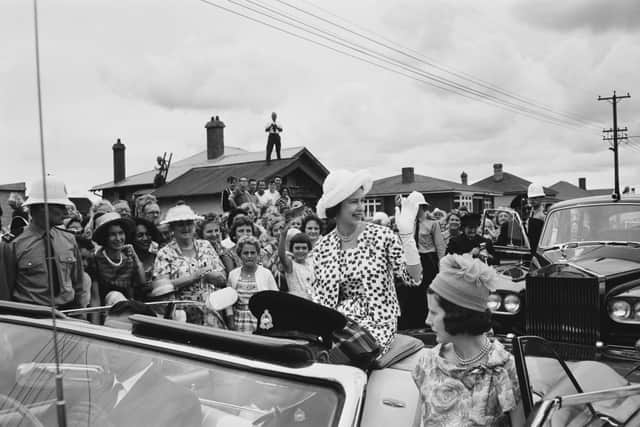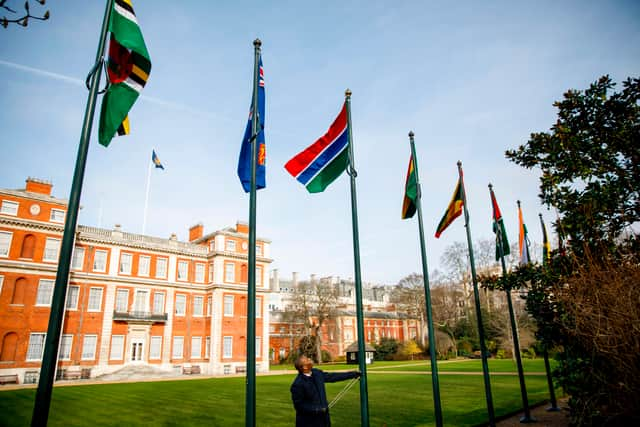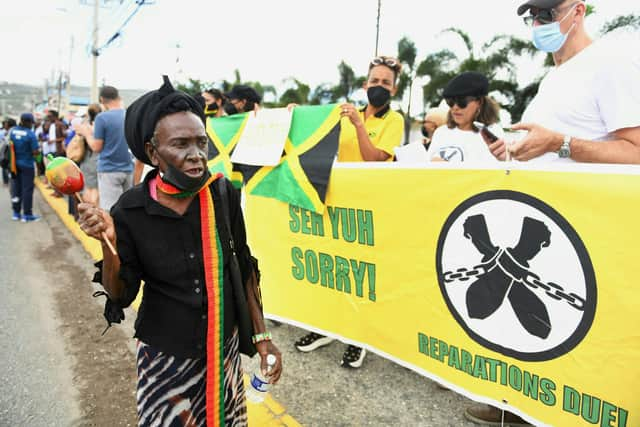King Charles III coronation: Which commonwealth countries are thinking about becoming a republic?
and live on Freeview channel 276
With the upcoming coronation of King Charles III, many countries across the globe have a renewed interest in exiting the Commonwealth of Nations. On March 13, King Charles III signed the Commonwealth Charter as the new head of the establishment but will the association survive his reign? In 2022,
Queen Elizabeth II passed away and it was announced a new head of state would assume responsibility of the Commonwealth. The 96-year-old was the nation’s longest-reigning monarch, over seven years longer than Queen Victoria - who oversaw the establishment of the commonwealth in 1887.
Advertisement
Hide AdAdvertisement
Hide AdIn 2021, Barbados announced it would be the latest country to remove the British head of state and become a republic. With other countries like Jamaica, St. Lucia, and St. Vincent and the Grenadines all contemplating a similar fate, the future of the Commonwealth may look radically different to the one Queen Elizabeth II inherited in 1952.
Here is everything you need to know.
What is the Commonwealth?


In 1926, with the British Empire in a state of repair, it was settled that each member of the empire will be treated as equal and pledge allegiance to the King or Queen.
In this conference, a new community was formed, based upon democratic principles with each member working toward a similar goal. The community was referred to as the British Commonwealth of Nations.
Advertisement
Hide AdAdvertisement
Hide AdIt is important to note that the British Empire included regions around the globe that didn’t feature in this conference, including parts of Africa and India. The purpose of the Commonwealth involves the coordination of the following:
- Protecting the environment
- Develop society and young people
- Supporting democracy
- Boosting trade links
- Support small states
In 1949, two years after India declared independence from the British Empire, eight countries formed the modern Commonwealth; Australia, India, Canada, New Zealand, Pakistan, South Africa, Sri Lanka and the United Kingdom. The Principles were based on “freedom”, “equality”, “liberty”, and “cooperation” .
Which countries are a part of the Commonwealth?


The 55th country and first to join the Commonwealth under King Charles III’s reign is Gabon. President Ali Bongo Ondimba said: “In a world full of uncertainties, mostly created by humanity’s excesses and greed, we believe strongly that the Commonwealth family of nations is a unique and varied community of countries that share common values and whose diversity represents a formidable melting pot of ideas and solutions.”
Here is a full list of all the Commonwealth countries:
- Antigua and Barbuda
- Australia
- Bahamas
- Bangladesh
- Barbados
- Belize
- Botswana
- Brunei Darussalam
- Cameroon
- Canada
- Cyprus
- Dominica
- eSwatini
- Fiji
- Gabon
- Gambia
- Ghana
- Grenada
- Guyana
- India
- Jamaica
- Kenya
- Kiribati
- Lesotho
- Malawi
- Malaysia
- Maldives
- Malta
- Mauritius
- Mozambique
- Namibia
- Nauru
- New Zealand
- Nigeria
- Pakistan
- Papua New Guinea
- Rwanda
- Saint Lucia
- Samoa
- Seychelles
- Sierra Leone
- Singapore
- Solomon Islands
- South Africa
- Sri Lanka
- St Kitts and Nevis
- St Vincent and The Grenadines
- Tanzania
- Tonga
- Trinidad and Tobago
- Tuvalu
- Uganda
- United Kingdom
- Vanuatu
Which commonwealth countries are republics?
India’s shift to republicanism in 1949 influenced the Commonwealth of Nations’ decision to include republic states. Nowadays both independent and republic states can maintain membership to the Commonwealth.
Advertisement
Hide AdAdvertisement
Hide AdIreland and Zimbabwe are the only republic states to have withdrawn from the Commonwealth entirely. In 1948 and 2003 respectively.
Here is a list of Commonwealth republics and the year they first joined the Commonwealth:
- Bangladesh (1972)
- Barbados (2001)
- Botswana (1974)
- Cyprus (1961)
- Cameroon (1995)
- Dominica (1978)
- Fiji (1987)
- Gabon (2022)
- Gambia (1970)
- Ghana (1960)
- Guyana (1970)
- India (1950)
- Kenya (1964)
- Kiribati (1979)
- Malawi (1966)
- Maldives (1982)
- Malta (1974)
- Mauritius (1992)
- Mozambique (1995)
- Namibia (1990)
- Nauru (2000)
- Nigeria (1963)
- Pakistan (1956)
- Rwanda (2009)
- Samoa (1970)
- Seychelles (1976)
- Sierra Leone (1971)
- Singapore (1965)
- South Africa (1961)
- Sri Lanka (1972)
- Tanzania (1962)
- Togo (2022)
- Trinidad and Tobago (1976)
- Uganda (1963)
- Vanuatu (1980)
- Zambia (1964)
Which countries could leave Commonwealth to become a republic?


In September 2020, Barbados’s prime minister, Mia Mottley, said it was time for the country to leave its “colonial past behind” as they replaced their head of state with Dame Sandra Mason.
New Zealand
Prime Minister of New Zealand, Jacinda Ardern, has revealed that her government do not plan on transforming the country into a republic amidst news of Queen Elizabeth II’s passing. However, the Prime Minister has said she expects the country to replace its head of state, “in her lifetime”.
Advertisement
Hide AdAdvertisement
Hide AdJamaica
Earlier this year, the Prince and Princess of Wales’s visit to Jamaica was met with protests as the country seeks slavery reparations after 300 years of British Empire rule. There is sure to be renewed interest in the question following the death of Queen Elizabeth II.
In a statement from Andrew Holness, Prime Minister of Jamaica, he said: “Queen Elizabeth’s reign was transformative and inspiring; we are saddened that we will not see her light again, but we will remember her historic reign”
Australia
Australia - which held a republic referendum in 1999 - has recently enquired about eliminating British monarchal rule. However, Prime Minster, Anthony Albanese, has declared that his party won’t hold a referendum in his first term out of respect for the Queen.
“I think the important thing is, I think to commemorate the moment that we’re in now and it is a moment of reflection about an extraordinary life,” he said.
Advertisement
Hide AdAdvertisement
Hide AdAntigua and Bermuda
On the other hand, the Prime Minster of Antigua and Bermuda has confirmed that the country will give the public a republic referendum within three years.
Gaston Brown told ITV on Saturday: ““This is not an act of hostility or any difference between Antigua and Barbuda and the monarchy, but it is the final step to complete that circle of independence, to ensure that we are truly a sovereign nation.”
Saint Lucia
In 2015, a Constitutional Reform Commission produced a report recommending a break from the British monarchy. The Prime Minister, Philip J. Pierre, is yet to make a statement on Saint Lucia’s future inside the Commonwealth.
Saint Vincent and the Grenadines
In 2009, Saint Vincent and the Grenadines failed to abolish the British monarchy in a Consitutinonal referendum.
Advertisement
Hide AdAdvertisement
Hide AdPrime Minster, Ralph Gonsalves, has recently proposed that the country should consider replacing the British monarchy with an ‘executive president’ and that a republic referundum is a ‘national democratic task’.
Which Commonwealth countries is King Charles III head of state for?
King Charles is now the monarch and head of state of the UK and 14 countries in the Commonwealth realm. The Commonwealth Realm contains all member states that recognise King Charles III as their monarch and head of state.
- Antigua and Bermunda
- Australia
- The Bahamas
- Belize
- Canada
- Grenada
- Jamaica
- New Zealand
- Papua New Guinea
- Saints Kitts and Nevis
- Saint Lucia
- Saint Vincent and the Grenadines
- Solomon Islands
- Tuvalu
Comment Guidelines
National World encourages reader discussion on our stories. User feedback, insights and back-and-forth exchanges add a rich layer of context to reporting. Please review our Community Guidelines before commenting.
